Young Iranian Protester Blinded In One Eye Stranded In Turkey
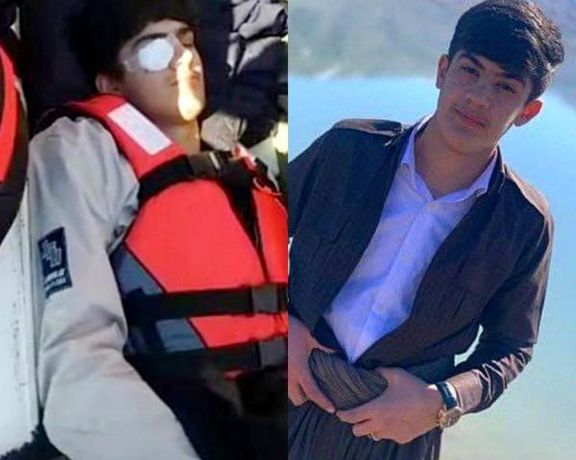
Iranians launched a Twitter storm on Monday in support of Zanyar Tondro, an 18-year-old man who was has lost an eye in the anti-regime protests.

Iranians launched a Twitter storm on Monday in support of Zanyar Tondro, an 18-year-old man who was has lost an eye in the anti-regime protests.
Zanyar, along with his father, left Iran for treatment in Europe in the past weeks, but after their boat capsized, he was arrested by the Turkish police and taken to a refugee camp in the southwestern city of Mugla.
Social media users tweeted the hashtags #ZanyarTondro in Farsi and English asking for his treatment.
Informed sources have described Zanyar's condition as "unsuitable" to stay in Turkey due to lack of access to treatment and medicine.
On March 25, Kurdistan Press Agency published pictures of Zaniar who was on the way to Europe on a boat of refugees in Greek waters.
During the protests following the death in custody of Mahsa Amini, Zanyar lost his right eye when he was shot by regime forces. Reports say there are still 11 birdshots left in Zanyar's head, which have endangered his left eye as well.
A large number of protesters have been shot in the face and have lost one or both eyes during the protests that are still underway after more than six months.
The Oslo-based Iran Human Rights Organization says the shootings in the face and eyes were "systematic", but the Iranian officials have denied it.

Amnesty International has urged Iran’s Chief Justice to revoke the "unjust conviction" of Jamshid Sharmahd, an opponent of the Islamic Republic, and to revoke his death sentence.
In a letter on Monday to Gholamhossein Mohseni Ejei, Amnesty said German-Iranian political dissident, Sharmahd, is at risk of execution after being sentenced to death for “corruption on earth” following a grossly unfair trial.
It goes on to say that since July 2020, the Iranian authorities have been subjecting him to enforced disappearance, torture and other ill-treatment including through prolonged solitary confinement and denial of adequate healthcare.
The international rights group also urged Ejei to reveal Sharmahd’s “fate and whereabouts and, in light of his arbitrary detention, immediately release him.”
Amnesty further asked the authorities that if they do not intend to release him, at least ensure that he is given regular access to family, adequate medical care, including dental care, a lawyer of his choosing and consular assistance from the German authorities.
Sharmahd, the director of Tondar opposition group, has been held in solitary confinement for hundreds of days, and during this time, he has been denied an independent attorney and fair legal procedures.
The news of his kidnapping in Dubai and his transfer to Tehran by Islamic Republic agents was first released in August 2020. The Islamic Republic has alleged that Sharmahd was involved in a 2008 bombing on a mosque in Shiraz that killed 14 people and wounded 200 more, something he and his family vehemently deny.
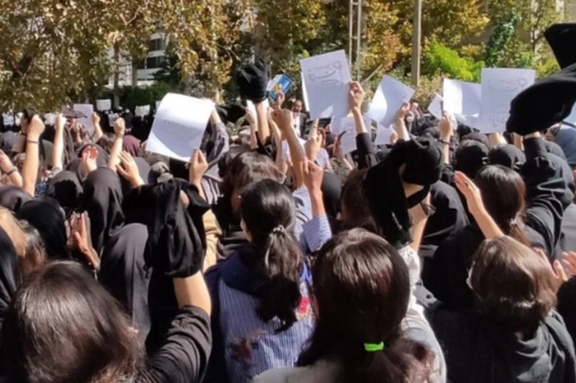
The ministry of higher education said institutions under its coverage will no longer offer educational and other services to students who do not abide by hijab rules.
“All universities and higher education institutions under the coverage of the ministry of sciences, research and technology will not be obliged to offer educational, welfare and other services to the few students who do not abide by the laws and regulations of the universities in this regard,” the ministry said in a statement Monday.
Speaking to the moderate conservative Khabar Online news website, Hassan Kia, attorney at law, said the statement is in violation of the Iranian constitution which gives every citizen the right to education and forbids government bodies from making their own laws.
Hijab defenders who rallied outside the governor’s office in Ramsar threatening to take the matter into their own hands.
“It is not clear who, and how, is going to decide whether the hijab rules have been broken or not in a university? Does letting a few locks of hair show from under a headscarf mean the rules have been broken or is it totally flouting the hijab, or putting it around one’s neck? Who is going to decide? This can cause a lot of strife in universities,” he said.
An ever-increasing number of women have been casting off their compulsory hijab for good since the beginning of the “Woman, Life, Freedom” movement six months ago but hardliners are now taking a much more aggressive approach to the issue of hijab to punish and bring these women under control.
“The issue of compulsory hijab is so intertwined with the existence of the suppressive Islamic Republic that [it considers] even taking one step back as total defeat,” Toronto-based women’s rights researcher Leili Pourzand told Iran International TV.
A female student wearing no hijab grilling the hardliner mayor of Tehran at Sharif University in December.
Most officials and hardliners insist that flouting hijab is a crime that must be dealt with, and the ministry of interior said in a statement last week that the Islamic Republic would enforce the hijab as an “unquestionable requirement of the Sharia.” When asked about the issue a few days ago, President Ebrahim Raisi also stressed that women must abide by the hijab rules because it is “law”.
The ultra-hardliner politicians and clerics who have been demanding stricter enforcement of the hijab have also called on their supporters to actively carry out their Islamic duty of “calling to virtue and forbidding wrong”. This, however, is causing many angry encounters in between the vigilantes and women who refuse to be bullied into wearing the hijab.

Even some regime insiders who do not question the necessity of hijab as a principle are critical of the aggressiveness of vigilantes and the energy and time that the government is spending to enforce the hijab instead of addressing more vital matters such improvement of the economy, corruption, and poverty.
“I seriously believe that we are distancing ourselves from the real teachings of Islam … when authorities show more sensitivity to girls’ hair than to bribery, embezzlement, garbage scavenging, injustice and the usury that has overtaken our banks,” Moeinoddin Saeedi, representative of Chabahar in the parliament, said Monday.
Some ultra-hardliners in the parliament have taken steps to enact new hijab legislation to punish those who refuse to abide by the rules by imposing cash fines of up to $60,000 and other penalties including revocation of drivers’ licenses and passports, or a ban on the use of the internet for celebrities and social media influencers and bloggers.
Parliament Speaker Mohammad-Bagher Ghalibaf, according to one of the lawmakers behind the plan, Morteza Agha-Tehrani, has promised to help urgently pass the new hijab legislation.

The former mayor of Tehran has said the international community's concerns are justified about the regime, by referring to a vigilante throwing yogurt at women without hijab.
Gholamhossein Karbaschi wrote in a tweet on Sunday “when there are people in the country who do not use yogurt peacefully, how the world can ensure other sensitive capabilities are used peacefully.”
The member of centrist proreform Executives of Construction Party did not explain further, but it seems he was referring to the nuclear program of the Islamic Republic, which Tehran claims to be for "peaceful purposes", but the international community is worried about intentions to build nuclear weapons secretly.
A video from the CCTV of a convenience store in Shandiz near the religious city of Mashhad went viral on social media Friday that showed a man dumping a large tub of yogurt after an argument on the head of a ‘hijabless’ woman and her mother, who was wearing a headscarf.
The man, apparently a member of the Revolutionary Guard Basij militia, had been carrying out his Islamic duty of “calling to virtue and forbidding wrong”. Local authorities said Saturday the man was arrested for disturbing public peace and insulting the women. Officials said that carrying out the duty of hijab enforcement should remain limited to verbal warnings only.
Both women were also arrested for defying hijab rules and the owner of the business was given a warning for allowing violation of the hijab law on his premises.
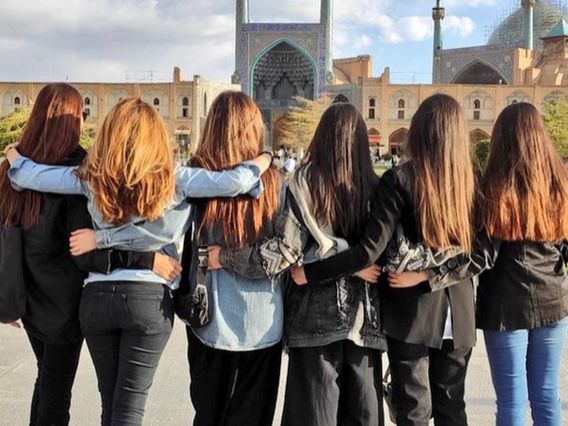
A reformist politician says the protests against the Islamic Republic will become stronger with every atrocity the regime commits against the protesters.
Mohsen Mirdamadi said on Sunday that "If something similar to Mehsa Amini's death (which sparked nationwide antiregime protests) happens once again, there is still this hidden potential in society to rise again and become the source of widespread protests."
In an opinion piece on Tehran's leading reformist daily Etemad, Mirdamadi said, "Experience has shown that as time passes, the protests will be stronger than in previous periods."
The former member of the parliament emphasized that it is not possible to solve Iran's current crises and challenges with "superficial reforms" and that "serious changes need to take place" without elaborating on the details of the changes.
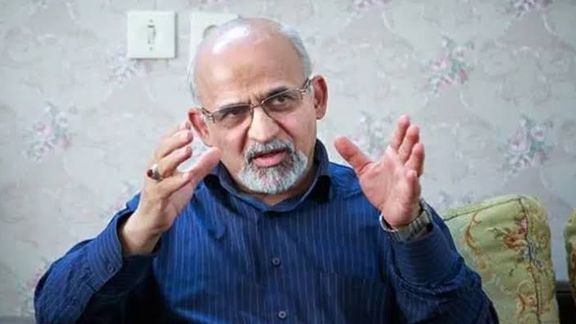
Referring to the ‘women, life, liberty’ movement, he said that these protests "were a spark to the gunpowder of demands” of the people, suggesting that people had been fed up with the strict rules that enforced by the Islamic Republic. “Nothing has happened that we can say grievances have been resolved,” he said, referring to the popular protests that have led to the death of over 500 protesters in the hands of the regime’s security forces.
He also decried the Islamic Republic for not taking into account the opinions of the general public, saying that the regime has shifted its focus from peoples’ vote to a military rule.
His remarks came as the Islamic Republic is suppressing any voice of dissent and has moved to deprive women, who fail to comply to its strict hijab regulations, from public services.
Mohsen Borhani, a professor of criminal law at Tehran university, who was recently sacked for criticizing the regime after the execution of four young protesters, said in a tweet on Sunday that "Preventing women from entering public places or not providing services at airports, etc., on the pretext of not observing hijab, has no legal bases and is a completely illegal action."
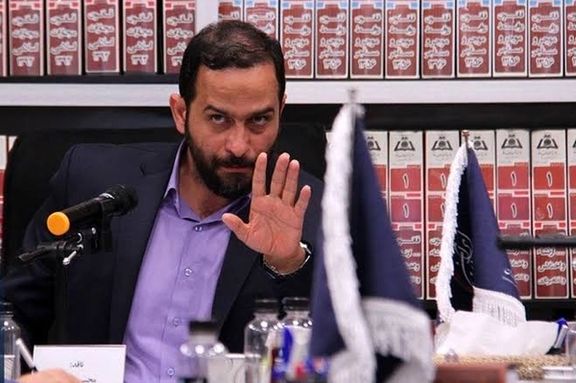
Attacking people and their property or violating their dignity and rights are criminal acts and victims have the right to self-defense according to Article 156 of the Islamic Penal Code of Iran, Borhani wrote. He was referring to a viral video that showed that flight ticket issuing agents at Shiraz airport do not provide services to women without the mandatory hijab.
Conflicts between vigilantes and women defying hijab in public occur almost daily now while authorities including the President insist on enforcement of rules. As regime supporters take the law into their own hands to combat the hijab rebellion, a man emptying a yogurt bucket onto the heads of two uncovered women has caused outrage in Iran.
Iran’s Chief Justice Gholamhossein Mohseni Ejei this week reiterated threats against those daring to uncover. He warned women will be “prosecuted without mercy,” he said, without saying what the punishment entails.
The conflict over the observance of the Islamic Republic’s strict interpretation of the dress code – or hijab – has been a contentious issue in the past few weeks, leading to tensions that can suddenly blow into confrontations and protests.
Following the death in custody of Mahsa Amini, arrested for not wearing the hijab in a proper manner, women are increasingly appearing in public and on social media without the headscarf, with many burning it in public protest. Defiance of hijab rules as a form of civil disobedience has hugely grown across the country after her death. Many believe that there is no sign ‘hijabless’ women will allow to be bullied again into wearing the hijab.
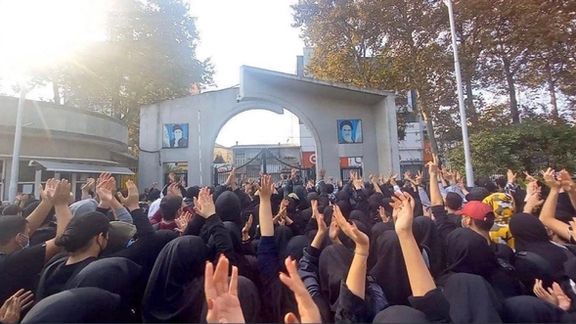
Iran’s health and education ministries say their educational centers will not be providing services to students who do not observe the mandatory hijab.
In a message to congratulate the opening of universities in the new Iranian year on Monday, Deputy Health Minister Abbas Shirojan thanked the students who comply with dress code, and announced the universities of the health ministry will not provide services to students without hijab.
Meanwhile, the education ministry in a separate statement announced that women who do not comply with the compulsory hijab will not be allowed to attend classes.
During the nationwide protests in Iran following the death in custody of Mahsa Amini, universities have been the hotbed of protests with hundreds of students were arrested, in addition to targeted poisoning attacks on girls’ schools.
As the regime fights a losing battle against the wave of women participating in a nationwide hijab rebellion, hardliner regime supporters vow more strict measures.
In recent days, dozens of shops and malls where Iranian women continue to flout the regime’s mandatory hijab rules have been closed down across the country with dozens more women arrested.
In the past four decades women generally demonstrated their opposition to compulsory hijab by making their headscarves smaller.
Defiance of hijab rules as a form of civil disobedience ha grown across the country after the death the 22-year-old Mahsa Amini in custody of morality police in mid-September.